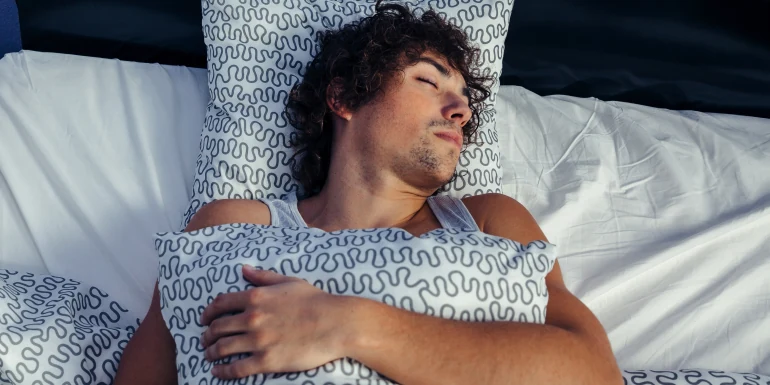
What type of sleeper are you?
Certain people are already productive early in the morning, whereas others only get a surge of energy in the evening. Our genes are decisive where this is concerned.
There are twenty genes now known to control our body clock (i.e. our biorhythm). The biorhythm influences our metabolism, organ activities and ability to concentrate. This in turn determines our personal performance phases. The body clock cannot simply be adjusted. However, it can change slightly during our lifetimes. Children and the elderly tend to be early birds, whereas young people are usually morning grouches.
Types of sleepers: owl and lark
The two most well-known types of sleepers are named after their role models from the bird world: the owl and the lark. However, many people are a mixture of the two
Lark
Larks are early risers. Their molecular biological body clock runs faster than the actual time of day. Larks already have their most productive phase before midday. Instead, they already get tired early in the evening. Nevertheless, even a lark stays up late to cheer in the New Year.
Owl
Owls always lag behind the larks. This phenomenon is called social jetlag. As a typical morning grouch, you prefer to get up late and perform best in the evening. However, even an owl turns into an early bird to catch a plane to go on holiday.
In Central Europe, there are more owls than there are larks. However, most people are a mixture of the two or normal types of sleepers who cannot clearly identify as being an owl or lark. It is still not clear to this day why owls are in the majority. It might be due to our genes. However, it is also possible that artificial light influences our behaviour and tends to keep us awake in the evening.
Enjoy a good night’s sleep with the Helsana Coach app
Relax your body and calm your breathing – using the tips and exercises for a better night’s sleep, you can combat sleeping problems in the short and long term.
Download the Helsana Coach app now and let’s get started.
Types of sleepers: lion, wolf, bear and dolphin
The American sleep scientist, Michael Breus, revised the owls and larks model and identified a total of four types of sleepers. Whoever knows what type of sleeper they are can optimise their daily routine accordingly, thus improving their performance.
Lion
Lions are early risers. In the morning, they are attentive and productive. They plan their day after getting up. They already get tired early in the afternoon and fall asleep quickly in the evening. Lions are ambitious and conscientious. They think analytically and are optimists.
Wolf
Wolves are morning grouches. They prefer to only get up after 11 am. They get a surge in energy at about 7 pm. They rarely go to bed before midnight. Wolves have creative minds and like taking risks. They tend to be moody and impulsive.
Bear
Although bears sleep a lot and deeply, they always have the feeling that they don’t get enough sleep. In the morning, they often press the snooze button. They are most productive at midday. Bears are extroverted and cheerful. Loyalty is very important to them. They steer clear of conflicts.
Dolphin
Dolphins wake up frequently during the night and therefore feel tired. They get a surge of energy at about 7 pm. They go to bed shortly before midnight. Dolphins are intelligent and tend to be perfectionists. They are rather anxious and introverted.
Take the test: owl or lark?
- I go to bed at about 10 pm. I usually fall asleep quickly. (1 point)
- I usually only go to bed between 10 pm and 1 am. (3 points)
- I never go to bed at the same time. (2 points)
- I virtually always sleep right through. (1 point)
- I wake up several times as morning approaches. (2 points)
- I have trouble getting to sleep but then I sleep through. (3 points)
- I always press the snooze button in the morning. I find it difficult to get up. (3 points)
- I am usually already awake before the alarm goes off in the morning. I then get up immediately. (1 point)
- Waking up is never the same for me. (2 points)
- How quickly I wake up varies. (2 points)
- I need some time in the morning until I am wide awake. (3 points)
- When I get up, I am immediately fit and alert. (1 point)
- I perform best in the morning or early morning. (1 point)
- My performance varies depending on my form on the day. (2 points)
- I perform best in the afternoon and evening. (3 points)
- I try to hold important conversations in the evening. (3 points)
- I plan to complete important duties in the morning. (1 point)
- I usually plan my day spontaneously. (2 points)
- Night-time is the best time for me to relax. (3 points)
- I virtually never relax. (2 points)
- I can only really relax and switch off in the evening. (1 point)
- When I have a day off, I sometimes wake up late and sometimes early. (2 points)
- I wake up early even if I have a day off. (1 point)
- I really like sleeping in. (3 points)
- 8 to 12 points: lark
- 13 to 18 points: mixed type of sleeper
- 19 to 24 points: owl



Newsletter
Find out more about current health issues every month and get all the information you need about our attractive offers from all Helsana Group companies * delivered by e-mail to read whenever it suits you. Our newsletter is free of charge and you can sign up here:
We did not receive your information. Please try again later.
* The Helsana Group comprises Helsana Insurance Company Ltd, Helsana Supplementary Insurances Ltd and Helsana Accidents Ltd.
